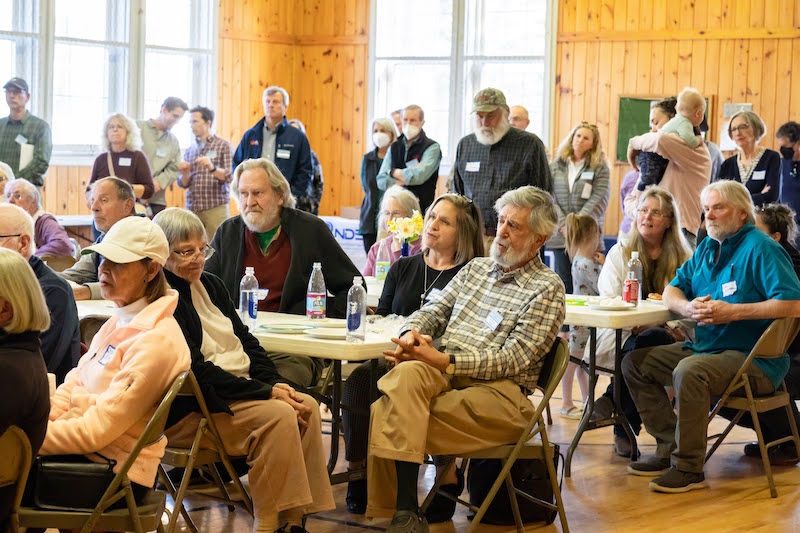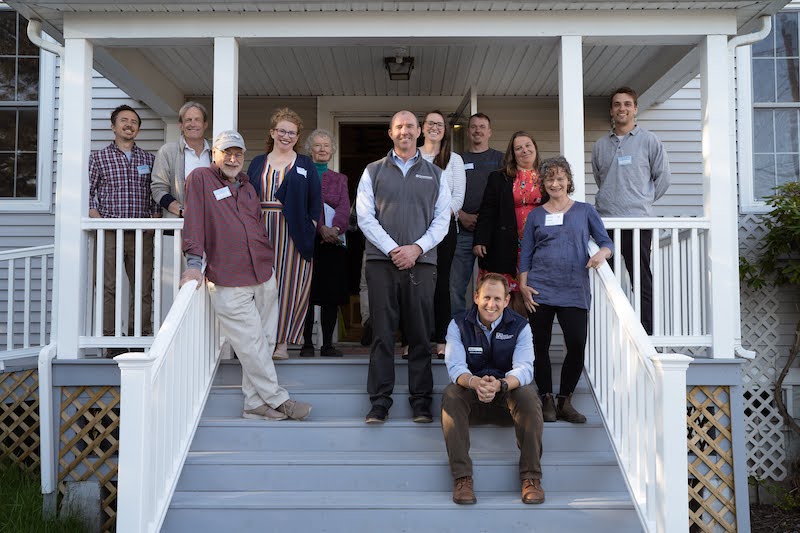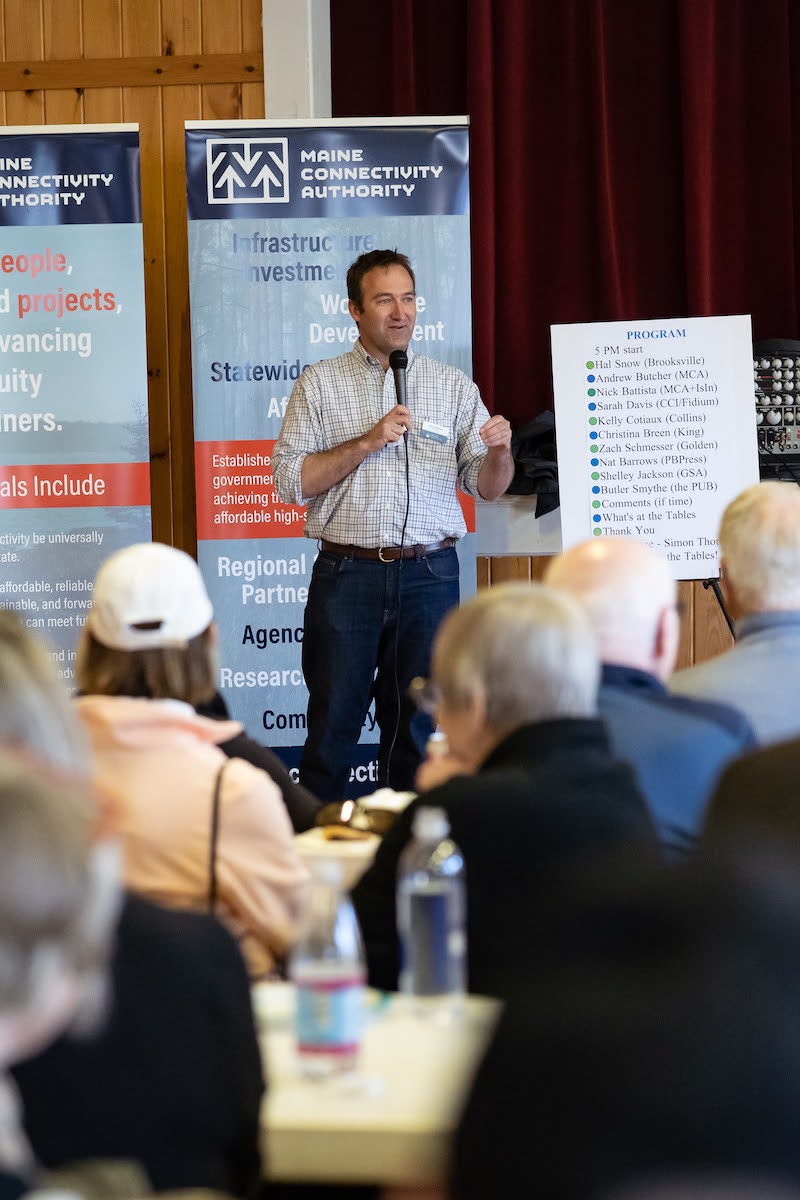
Six years ago, in the summer of 2017, Island Institute staff facilitated meetings with community members from across the Blue Hill Peninsula who shared a concern about the lack of access to high-speed internet. The goal was to explore whether working together as multiple towns could leverage more opportunities for public and private investment in critically needed infrastructure. While no one at the time thought it would be easy to organize multiple towns that might still be harboring grudges over the results of the last high school basketball season, they also probably didn’t expect to be working for several years before seeing the fruits of their labor.
Last week in Brooksville, Maine, however, we got to celebrate the culmination of a regional vision summed up by one community member back in 2017 as “wicked fast broadband on the peninsula.”
Blue Hill, Brooklin, Brooksville, Castine, Deer Isle, Penobscot, Sedgwick, and Stonington are now served by world-class internet. The fiber-to-the-home network built by Fidium (of Consolidated Communications) was made possible by a multi-million federal dollar grant won by the State of Maine in 2022 because these communities were ready. But that readiness didn’t happen overnight. It was countless hours of community meetings, hard work, and support from our staff and other partners, plus $55,000 in Island Institute planning grants that eventually leveraged over $10 million of public and private investments to connect 15,000 homes on the Blue Hill Peninsula.
Looking around the Brooksville Community Center on May 9, 2023, it was incredible to see the generations of residents celebrating the completion of the internet upgrade that’s launching their peninsula into the present moment. Broadband builds community, and residents see it as an investment into the future of Blue Hill Peninsula’s viability.

One resident with a flip phone suggested that now he might be able to get a smartphone and Zoom with his daughter in California. For local business owners, remote workers, and students, there’s no question of how this project will change their lives. As Shelley Borror, current head of Blue Hill’s regional academy shared, “Simply put, schools cannot function without reliable, fast internet. All communications between families and students are electronic. Students receive schedules and grades that way. They read online. Many textbooks are no longer published in hard copy. Papers are submitted and graded online. This is today’s school, and our improved internet is indeed real cause for celebration.”
So what’s next for the Blue Hill region?
As broadband projects like this one come online across the state of Maine, the conversation is finally coming back to the original why that brought Island Institute and our community partners together around this issue in the first place. These communities share an understanding that improved infrastructure is just part of the equation required to meet the needs shared by community members in Brooksville, and this is where digital equity comes in.

Island Institute is privileged to be a partner helping to craft Maine’s Digital Equity Plan as part of the Maine Connectivity Authority’s Regional and Tribal Broadband Partners program. With partners across Hancock and Waldo counties over the past few months, we drafted a Regional Digital Inclusion plan that works toward this shared vision:
Everyone in our region, from the hills, farms, and dirt roads to the village centers, waterfronts, and islands, will have access to:
- affordable broadband (fast and reliable internet) no matter where they live
- affordable internet-connected devices to meet their needs
- free digital skills training and technical support to achieve their goals
Universal access to these tools will build community and economic resilience; support education, healthcare, and entrepreneurship; and decrease isolation so that all people can thrive as they live, work, and play in Hancock and Waldo Counties now and in the future.

Across the state, 13 regional coalitions like ours have written plans that all roll up to Maine’s statewide Digital Equity Plan. This summer, Maine’s plan will be submitted to the National Telecommunications and Information Administration, the federal agency responsible for distributing close to $45 billion of funding from the Bipartisan Infrastructure Law for broadband and digital equity. The better our plans and the stronger our partnerships are now, the more resources we’ll be able to bring to our state to realize our communities’ visions in the next few years.
That’s the what, where, when, and why of this present moment for broadband in Maine. But as editor of Penobscot Bay Press Nat Barrows of Deer Isle, reminded us this week in Brooksville, the most important ingredient in the Blue Hill Peninsula broadband project is the who. While non-profits like Island Institute, private enterprises like Fidium, and state agencies like Maine Connectivity Authority are critical partners for bringing 21st-century internet to Maine, the real work of digital inclusion comes down to the local volunteers writing comprehensive plans, organizing community meetings, providing tech help at libraries, and working on behalf of all, not just a few.
In Barrow’s words, “It is volunteers who provide the work, the wisdom, and wealth that creates strong, vibrant, coherent and functional communities. Volunteering is an act of love that transcends time and space.”
All Mainers will have the opportunity to weigh in on the state’s digital equity plan this summer, and we look forward to continuing to support Maine’s coastal regions to create local plans of their own.

